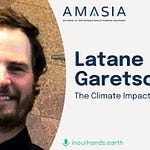In this episode, Ramanan speaks with Genevieve Guenther, a Renaissance scholar and literary critic at The New School who turned to climate activism after having a child and becoming increasingly alarmed about the world she might leave to her son after she died. They discuss the forces that shape our climate discourse and how to communicate effectively about the climate crisis.
Full transcript available above. This episode is also available on Apple Podcasts and Spotify.
In Our Hands is a production of Amasia. Follow these links for more about our firm, the Amasia blog, our climate fiction podcast, and Ramanan’s blog.
Highlights
[00:01:26] Dr. Guenther’s Humanities Skillset
[00:07:59] Underlying Societal Beliefs About Nature and Progress
[00:12:29] Media Coverage of Climate
[00:16:45] Principles of Climate Communication
[00:20:36] Tone & Style of Communication
[00:27:02] Encouraging Sustainable Effort












